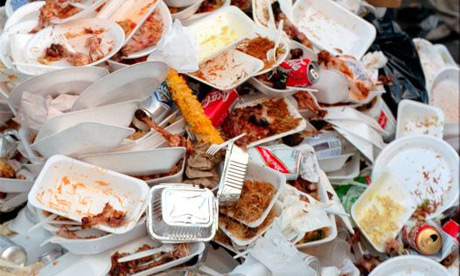DP #2: Food Waste in gastronomy industry
In this post I would like to pay more attention to the problem covered by me. For those that thought that I will give them answers so quickly, I will have to say: „Sorry. You’ll have to wait.” I want to tackle some more issues that are important for the development of this topic.
For those, who don’t think that food waste in restaurants and its „derivatives” is a significant share, I wanted to highlight, again, its weight. According to the latest reports about food wastes, 30% of all meals in the USA are eaten away from home and the

Food wastes from fast food eateries.
same happens on average in western European countries. This share stands for 40% of „food dollars” eaten in restaurants. It shows that the gastronomy market is doing well. As it is a quite homogenous market and it has an enormous impact on food wastes growth, governments should implement strict regulations (this issue will be covered in my fourth post).
Continuing the ideas I’ve mentioned in my previous post, I would like to point out some ridiculous situations that are common in gastronomy, but nobody seems to care about it. As I said restaurants are being very strict with their wastes, not only according to garbage but also to employees. Sometimes, if they are caught on eating, taking home or donating the food prepared for waste, they may be considered as thieves and very often loose their jobs. Question is, why are those draconian and unnatural policies a norm in the corporate food industry?
In my opinion there are several reasons for that. First of all corporations are afraid of theft from their employees. If they would allow to take “rotten” food home, they would never know if they took the fresh one or the old one. But still, at the end of the day they throw out the same amount of food that hypothetically could be stolen. Another reason is the fact that restaurants fear of being legally liable. Donations usually have to pass through the hands of third parties. This indirect transfers of food is not properly stored and people are apt to lead to illness. Moreover, restaurants are simply afraid of badly influencing their image. In my opinion it is the most important factor that prevents “eateries” of donating food to the most needed. If something goes wrong, everybody will ask: “Where did you get your food from?” People will ask, tell and suddenly, through the word of mouth (the best marketing tool known to men till now), the reputation of a certain place is so low that nobody would go there again.
There is also another reason why there is so much food wastes in worlds restaurants, especially in chain restaurants. It is due to

Ineffective forecast of what one might eat.
the enormous portions that people got used to. Even if they are not able to eat the whole plate, they feel as they’ve made a good deal. It is something that I was always arguing with my friends. It was this endless discussion about chips. On the store shelf you have to choose: one pack for €1.5 or two packs for €2.5. Their argument was: lets buy two, it’s cheaper. Yes it is, but of course they won’t be able to eat the two packs. For me it was a waste not only of food (if one would call Cheeto’s food) but also money. But this is how most people think and act.
While reading different documents, articles or getting to know different organizations that speak about food wastes in restaurant I get frustrated. Even if a lot of actions and movements are being organized through the whole world, it seems like people do not care. People need to realize that by supporting food industry corporations, they are supporting waste. Corporations works only thanks to their clients, and if clients change corporations will have to change their behavior as well. I am aware that it is easy to say, but unfortunately corporation have so much power that sometimes even some fines won’t scare them from polluting. In my opinion, and I’m being positive here, the best way to change people’s behavior is to show by example. So everybody that cares, please show the others (word of mouth) how to act!
In the next post I will present what is being done at the moment to decrease the amount of food waste in gastronomy industry.
References:
1. Gustavson, Jenny; Cederberg, Christel; Sonesson, Ulf; van Otterdijk, Robert; Meybeck, Alexandre (2011). Global Food Losses and Food Waste
2. www.sustainablefoodnews.com “80% of U.S. diners concerned over restaurant food waste”
3. http://www.restaurant.org/sustainability/restaurantsrecycle/ ”A Survey of Restaurants Recycling Practices”




.png)
].gif)
.png)
].png)
].png)
].png)
.png)
].png)
.png)
